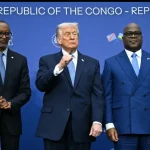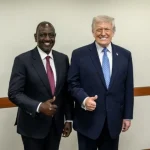The recent imposition of a Sunday 6 p.m. deadline to Hamas by former President Donald Trump represents more than just political theater—it constitutes a significant national security event with implications for intelligence operations, diplomatic security, and constitutional governance. As a private citizen, Trump’s direct engagement with an internationally designated terrorist organization creates multiple layers of security concerns that demand careful examination.
The Intelligence Community Dilemma
When private citizens engage in high-stakes international negotiations, they create immediate challenges for the intelligence apparatus:
-
Compromising Sensitive Channels: Official U.S. communication channels with Hamas typically flow through intelligence services and designated intermediaries like Qatar and Egypt. Private interventions can expose these carefully constructed networks, potentially compromising sources and methods developed over years.
-
Creating Information Chaos: Intelligence agencies now face the challenge of distinguishing between official U.S. policy positions and private political statements. This confusion can lead to critical misinterpretations by both allies and adversaries, potentially affecting battlefield decisions and diplomatic initiatives.
-
Undermining Counter-Terrorism Strategy: Public deadlines to terrorist organizations can disrupt carefully calibrated counter-terrorism approaches that balance military pressure with diplomatic outreach, potentially escalating conflicts at inopportune moments.
Legal and Constitutional Implications
The situation raises serious questions about the boundaries of private citizen engagement in foreign policy:
-
The Logan Act Considerations: While rarely enforced, the 1799 Logan Act specifically prohibits private citizens from engaging in unauthorized diplomacy with foreign governments or entities “in relation to any disputes or controversies with the United States.” The legal interpretation of whether this applies to communications with designated terrorist organizations remains untested but relevant.
-
Command and Control Risks: Such interventions create confusion about who speaks for the United States in critical negotiations. This ambiguity can be exploited by adversaries seeking to divide U.S. leadership or create separate, more favorable channels of communication.
-
Precedent Setting: The normalization of private citizen diplomacy, particularly by former presidents with access to classified information, establishes a dangerous precedent that could be exploited by other nations and non-state actors in future conflicts.
Operational Security Consequences
The practical implications for ongoing operations are substantial:
-
Negotiating Leverage Erosion: By establishing public deadlines, private citizens can inadvertently reveal U.S. or Israeli negotiating positions and timelines, reducing leverage in sensitive hostage negotiations or ceasefire discussions.
-
Alliance Management Challenges: Key partners, including Qatar, Egypt, and European allies, now face uncertainty about which American voice represents actual policy, potentially weakening coalition cohesion and intelligence sharing.
-
Force Protection Concerns: Such public statements can directly impact the security of U.S. personnel and assets in the region by triggering retaliatory actions or altering the calculated risk assessments of hostile actors.
The Broader Security Landscape
This incident reflects larger trends in the evolving nature of diplomatic engagement and national security:
-
The Blurring of Public and Private Diplomacy: The rise of social media and the persistence of political influence after leaving office have created new avenues for what was traditionally considered state-level diplomacy.
-
Information Warfare Vulnerabilities: Adversaries can exploit these parallel diplomatic channels to spread disinformation, test U.S. resolve, and create divisions within the American political system.
-
Continuity of Government Concerns: The situation highlights systemic vulnerabilities in maintaining consistent foreign policy during presidential transitions and between administrations of different parties.
Recommendations for Policy and Security
Moving forward, several measures could help mitigate these risks:
-
Clarification of Legal Boundaries: Congress should consider updating statutes governing private citizen diplomacy to account for modern communication technologies and the unique status of former presidents.
-
Enhanced Briefing Protocols: The intelligence community might develop more robust protocols for engaging with former presidents during international crises to ensure they don’t inadvertently undermine active negotiations.
-
Bipartisan Support for Official Channels: Political leaders across the spectrum should reaffirm the primacy of official diplomatic channels during active international conflicts.
The 6 p.m. Sunday deadline represents more than a political statement—it’s a case study in how the erosion of traditional diplomatic boundaries can create tangible national security risks. As the line between campaign rhetoric and foreign policy continues to blur, the United States must develop clearer rules of the road to protect its security interests while respecting political discourse. The consequences of failing to do so could extend far beyond any single conflict or election cycle.










